Vitamins and Health
What are Vitamins and why are they important?
Vitamins are micronutrients, which means that we only need them in small amounts. They are important for maintaining health, especially in cell growth and metabolism. Vitamins can be divided into 2 main groups, fat-soluble and water-soluble vitamins. Water-soluble vitamins (vitamin B & C) can dissolve in water and the excess from intake will be excreted through urine. Fat-soluble vitamins (vitamin A, D, E, & K), on the other hand, can only be dissolved in fat and have to rely on fat for digestion and absorption. Prolonged excessive consumption can lead to toxic effects.
What are the food sources of vitamins?
Vitamins are found in various food groups. It is easy to achieve adequate intake by following a balanced diet according to the “Healthy Eating Food Pyramid” recommendations.
| Vitamin A | 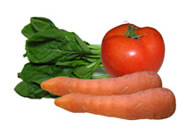
|
Fruits and vegetables are excellent sources of vitamin A and C. Vitamin A is required for normal night vision and healthy skin. It is found as carotenoids in deep yellow and dark green vegetables and fruits such as carrot, tomato, papaya, pumpkin, choi sum, and spinach. Vitamin A can also be obtained from liver, egg yolk, and fortified milk. About half a bowl of carrot meets daily vitamin A intake recommendation. |
| Vitamin B | 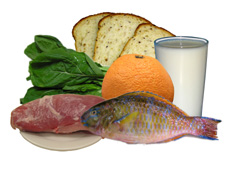
|
Good sources of vitamin B complex include grain products, meats and vegetables. Vitamin B12 is responsible for red blood cell metabolism. Inadequate consumption may lead to anemia. Meats and animal products such as beef, pork, poultry, fish, egg, and milk are excellent sources of vitamin B12. Deficiency may occur in vegetarians and in people with prolonged insufficient intake of meats or meat products. Whole grain products like whole wheat bread and oatmeal contain vitamin B1 and B6, which help with nutrient utilization, as well as muscle and nervous systems coordination. Folate, which also belongs to the vitamin B family, can prevent anemia and can be found in liver, green leafy vegetables (i.e. spinach, choi sum, etc.), orange, dried beans, and milk. Some research has also suggested that adequate intake of folate may lower risk of cardiovascular diseases. |
| Vitamin C | 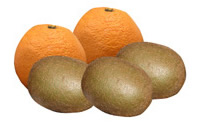
|
Vitamin C is an antioxidant and is necessary for effective wound healing, iron absorption, and immune function. A rare disease named scurvy is caused by inadequate intake of this vitamin. Some researches have found that it may reduce flu symptoms. The daily recommended intake can be achieved by eating one kiwifruit or one large orange a day. Smoking will destroy vitamin C in our body. Individuals who smoke and/ or have an inadequate fruit and vegetable intake may be deficient in vitamin C. |
| Vitamin D | 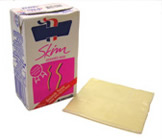
|
Milk products are good sources of vitamin A and D. Vitamin D is important for bone health, which helps to slow down bone loss and decrease fracture risk in the elderly. Our skin can make vitamin D after exposure to sunlight in about 10 to 15 minutes. Besides drinking vitamin D-fortified milk or soymilk, moderate outdoor activities are important to get enough of this vitamin. However, excessive sunbathing is unnecessary and not recommended. |
| Vitamin E | 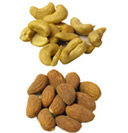
|
Plant foods such as nuts, dried beans, and green leafy vegetables are rich in vitamin E. Being a powerful antioxidant, this vitamin protects our cells from damage caused by substances called “free radicals” and it has been shown to delay the aging process. Some studies have suggested that vitamin E can decrease the risk of cardiovascular disease and improve cognitive function in elderly but the results are still inconclusive. |
| Vitamin K | 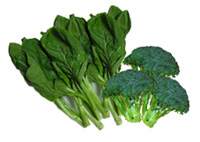
|
Vitamin K is involved in blood clotting. It is found in liver, green leafy vegetables (i.e. spinach, choi sum, broccoli, etc.) and green algae. Elderly on anticoagulant therapy should avoid taking vitamin K-containing supplements and should monitor their intake of vitamin K rich foods. |
How to preserve vitamins in food from loss during storage and cooking procedures?
Water-soluble vitamins (vitamin B & C) are labile micronutrients. They can be destroyed easily during food storage, processing, and cooking. Here are some ways to minimize nutrient loss when preparing the food.
- Eat food as soon as possible after purchase and
cooking.
- Prepare vegetables with shorter cooking time,
e.g. stir-frying with little oil.
- Cook vegetables with minimal water or by using
microwave
- Cut up fruits just before eating.
What can the elderly do if they have problem chewing fruits and vegetables?
Fruits and vegetables are rich in vitamins. Consuming at least 3 servings of vegetables and at least 2 servings of fruits daily can provide most of the recommended vitamins. For elderly with impaired chewing ability, they can choose fruits with softer texture, such as papaya, watermelon, banana, kiwifruit, dragon-fruit, etc. and cut fruits into small pieces before eating. Although the levels of water-soluble vitamins in vegetables after prolonged cooking decrease substantially, they still contain fat-soluble vitamins, minerals and dietary fibre, which are all beneficial to health. For those who have chewing problems, proper cooking and texture modification methods can help them to have adequate fruits and vegetables intake and avoid the unnecessary use of vitamin supplements.
Do the elderly need vitamin supplements? How can one make the right choices?
The best way to get vitamins is through a nutritionally balanced diet as nutrients can be better absorbed and utilized. Supplements are not substitutes for healthy eating. They do not provide minerals, fibre, antioxidants and phyto-chemicals that we get from foods. When nutrient intakes are insufficient, such as in people with health problems that prevent them from eating properly, vitamin supplementation may complement their diets in achieving the nutrition recommendations. Until now, there is little evidence to show that vitamin intakes higher than the suggested level can further promote health in healthy individuals.
There are many formulations of vitamin supplements available in the market with different dosages which may not be suitable for everyone. The levels of vitamins contained in the supplement are usually much higher than the recommended level. Side effects may occur with prolonged intake of certain vitamins. For example, liver toxicity may occur with excessive intake of vitamin A. Adverse effects from vitamin C supplement can include stomach discomfort and risk of developing kidney and urinary stones. Before considering taking a supplement, consult your doctor or dietitian.